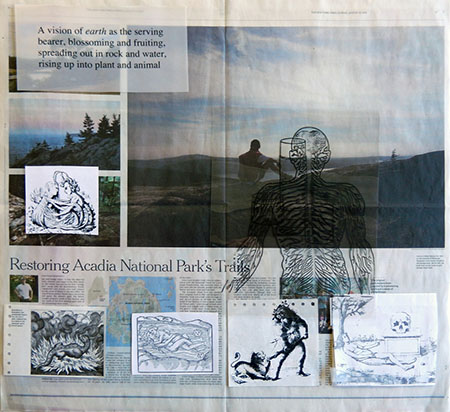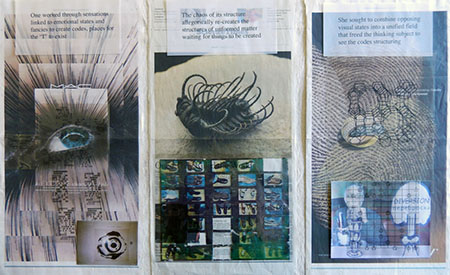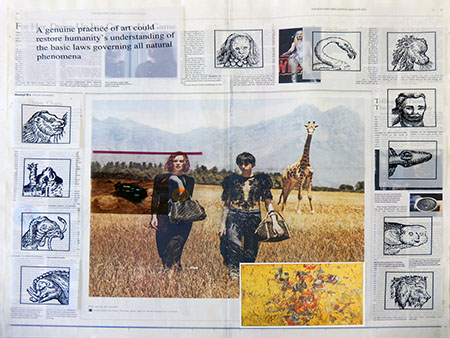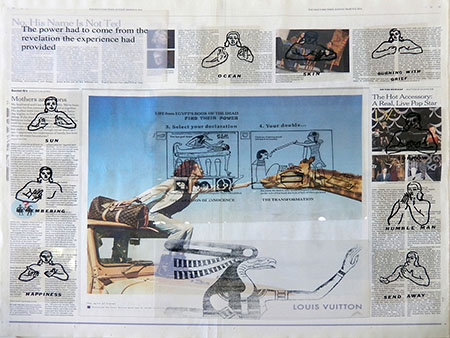 |
||
SONYA RAPOPORT: FINAL WORKS, November 14-December 19, 2015 |
||
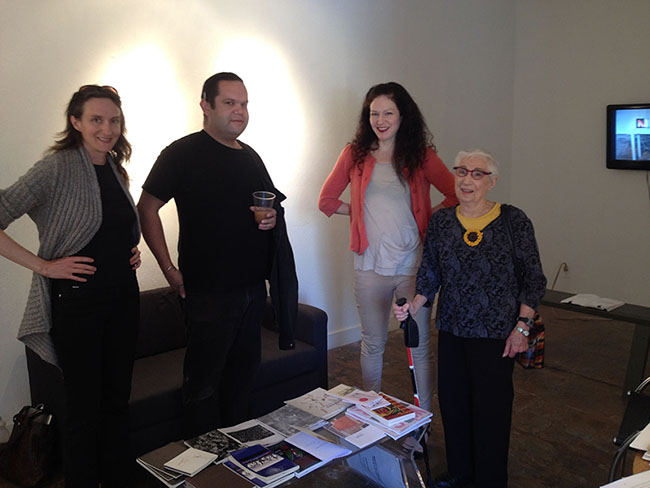 |
Krowswork’s yearlong experimental residency program and series of exhibitions concludes with pioneering Bay Area conceptual artist Sonya Rapoport. This cycle of ten residencies has refocused attention on the creative energy and processes that are the essential force of any artistic practice by providing the residents space and permission to present work in a gallery context where inquisitiveness and mutual exchange are privileged over static formalities. Rapoport’s artmaking process—iterative, inclusive, and aimed at invoking life’s expansiveness through close and curious study—can be seen as exemplary of the residency itself. Rapoport, who died at the age of 91 in June, had been active in the residency programming—engaged in both the other residents’ projects and steadfastly working toward the completion of her own. Following her intentions for the residency, Sonya Rapoport: Final Works presents the artist’s last two projects, Yes or No and The Transitive Property of Equality. Both of these works take the form of a series of collages that addresses the evolution of her 66-year career and conveys the parting observations of an extraordinary life lived in art. During the creation of Yes or No, Rapoport was engaged in the process of organizing and cataloguing the extensive archives of her research-based art practice, now preserved in perpetuity at the Bancroft Library of Western Americana at the University of California, Berkeley. This process of revisiting her past works is a defining methodology of Rapoport’s artmaking practice. In Yes or No, she collaged duplicate papers and image fragments from various periods in her career onto full-page New York Times advertisements. She presents this autobiographical montage in the context of quotations from The Modern Moves West: California Artists and Democratic Culture in the Twentieth Century by Richard Cándida Smith, which describe the work of Jay DeFeo, a former classmate of Rapoport’s at Berkeley. Struck by how Cándida Smith’s descriptions of DeFeo’s artistic process and creative life seemed to parallel her own, Rapoport used selected phrases as borrowed illuminations on her own artistic career, whimsically and unapologetically transforming printed language and assumed history from a fixed form into an alchemical tool whereby new meanings are made visible. The Transitive Property of Equality, completed in late May, is a direct result of Rapoport’s Krowswork residency, and also represents the 12th phase of her Objects on My Dresser series, a piece that originated in 1979. Structured according to the Tree of Life of the Kabbalah, and making use of short phrases from fellow resident Anne Lesley Selcer’s poem “The Natural World” (2014), this meditation on artmaking embodies Rapoport’s generous humor, unflinching critical eye, and fascination with categorization and matching. It also provides a poignant and poetic conclusion to the residency program itself, bringing full circle the Krowswork residency cycle begun by Selcer. Special thanks to the Sonya Rapoport Legacy Trust for their support of this presentation. Please join us for the opening reception, Saturday, November 14, from 6-9pm at Krowswork, 480 23rd Street, Oakland, California, 94612. For more information visit: krowswork.com or contact the gallery at info@krowswork.com or 510-229-7035.
|
Among the first women to receive an M.A. in Painting (UC Berkeley, 1949), Rapoport’s Abstract Expressionist work was given a solo exhibition at the California Palace of the Legion of Honor in 1963. She went on to explore pattern, painting on printed fabrics and developing a personal pictographic vocabulary using recontextualized stencils. In 1976 Rapoport began drawing on found computer printout paper, eventually leading to her reinvention as a digital artist. Her interactive installations used computer programs to gather, process, and represent data. An integral part of a community of artists experimenting with emerging computer technologies in the early 1980’s, Rapoport had an active role in MIT Press’ art, science, and technology journal Leonardo. Critical recognition of Rapoport’s contributions gained momentum in the last decade of her life. Rapoport leaves a 66-year artistic legacy that includes works in a variety of media, including paintings, works on paper, performance artifacts, books, videos, and web art. Her name is recognized nationally and internationally through her participation in over fifty major exhibitions, including the Whitney Biennial (2006), Bienal de Arte, Buenos Aires (2002), Zero1 Biennial, Silicon Valley (2012), Violence Without Bodies, Museo Reina Sofia, Madrid (2005), and Documenta 8, Kassel, Germany (1987). She was the subject of late-career retrospective exhibitions at KALA Art Institute, Berkeley (2011), Mills College Art Museum, Oakland (2012), The Fresno Art Museum (2013) and the book Pairing of Polarities: The Life and Art of Sonya Rapoport, edited by Terri Cohn (Heyday, 2012). Her archives are preserved in the Bancroft Library at the University of California, Berkeley. --- Farley Gwazda (MFA, UC Berkeley, 2008) was Sonya Rapoport’s assistant and occasional collaborator for several years, playing a key role in organizing, cataloguing, and placing her archives. He is now the director of the Sonya Rapoport Legacy Trust, and is working to preserve Sonya's artworks and promote her legacy. Farley is a practicing artist and educator, who co-founded the Martina }{ Johnston Gallery (2009 - 2014) in Berkeley with Indira Martina Morre, and is currently the director of the Worth Ryder Art Gallery at UC Berkeley. He has exhibited his drawing, video, and installation work widely in the Bay Area, including at Krowswork, Royal NoneSuch Gallery, Aggregate Space, and Green Chalk Contemporary, and will be participating in the upcoming David Park exhibition at Richmond Art Center. He lives and works in Berkeley. |
Sonya Rapoport (right) with (left to right): Jasmine Moorhead, director of Krowswork; Tooth, filmmaker and organizer of Black Hole Cinematheque; and Anne Lesley Selcer, poet and media artist who was Krowswork's first resident and whose poetry Sonya used in her final piece. Photo taken February 2015 at Krowswork. BELOW: Images from Yes or No
|
||
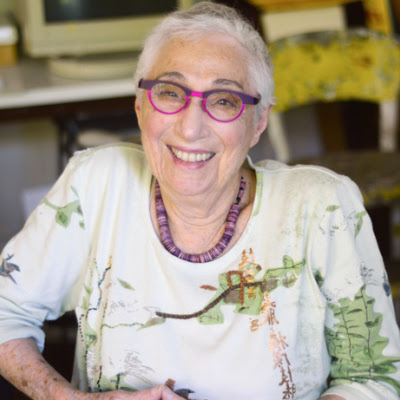 Sonya Rapoport (b. 1923, Brookline, MA; d. 2015, Berkeley, CA) was a conceptual artist best known for a visual language that appropriated the aesthetics of science and digital media. Her work is characterized by groundbreaking experimentation with computers and data collection, collaboration with eminent scientists and experts in the humanities, a fascination with categorization and systems of knowledge, a consistent reinvestigation of her own earlier work, and a profound feminist mission marked by strategic forays into male dominated fields. Her career represents a unique path from high modernist painting to contemporary conceptual and new media work.
Sonya Rapoport (b. 1923, Brookline, MA; d. 2015, Berkeley, CA) was a conceptual artist best known for a visual language that appropriated the aesthetics of science and digital media. Her work is characterized by groundbreaking experimentation with computers and data collection, collaboration with eminent scientists and experts in the humanities, a fascination with categorization and systems of knowledge, a consistent reinvestigation of her own earlier work, and a profound feminist mission marked by strategic forays into male dominated fields. Her career represents a unique path from high modernist painting to contemporary conceptual and new media work.